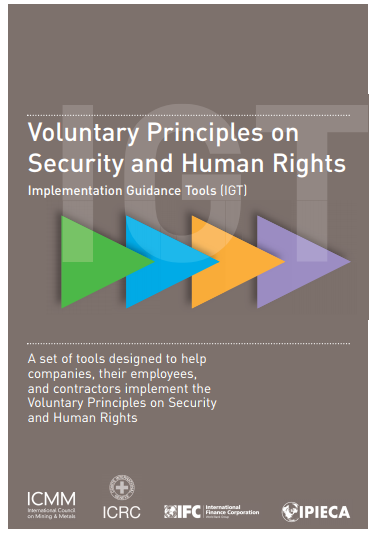The Voluntary Principles on Security and Human Rights (VPs) were developed in 2000 by governments, companies in the extractive and energy sectors (companies), and non-governmental organizations (NGOs). The Voluntary Principles are nonbinding and offer guidance to companies in maintaining the safety and security of their operations while ensuring respect for human rights and humanitarian law. The VPs cover three key elements, for which this IGT provides corresponding direction and guidance:
• Risk assessment – Companies should assess security risks and the potential for human rights abuses
• Public security providers – Companies should interact with public security providers (i.e. police, military), in a way that promotes the protection of human rights
• Private security providers – Companies should similarly interact with private security providers (i.e. contracted security) in a way that respects human rights
The VPs are designed to help extractive companies maintain the safety and security of their operations within an operating framework that ensures respect for human rights and fundamental freedoms and, when applicable, for international humanitarian law. Since then, other companies, governments, and NGOs have joined the initiative, and many other companies have publicly signaled that they apply the VPs at their operational sites.
Implementing the VPs can be challenging, however, especially when companies are operating in areas of conflict or weak governance. VPs participants have increasingly recognized the need for more practical tools to help those responsible for implementation in the field. Implementation is especially challenging for companies looking to apply the VPs who are not part of the initiative, as they have limited opportunities to share in the exchange of experience that is an integral part of participation in the VPs. Therefore, there was widespread recognition of the need to develop Implementation Guidance Tools.
The International Finance Corporation (“IFC”), the International Council on Mining and Metals (“ICMM”), and the global oil and gas industry association for environmental and social issues (“IPIECA”), who also recognized the need for such a set of tools, agreed to co-finance the project along with VPs Participants, who provide expert input. Expert guidance was also provided by the International Committee of the Red Cross (“ICRC”). These organizations oversaw the project and commissioned a team of consultants, led by Stratos and supported by the PSA Group, to develop the IGT in close consultation with VPs Participants.
The Implementation Guidance Tools are the result. They are non-prescriptive and provides a range of different tools on which companies may draw, according to their individual needs and circumstances. While VPs participants have been closely involved in the development of the tools, they have not been formally approved by them, since it is designed as guidance and is the result of co-operation between several organizations. While it has been designed with the extractives sector in mind, companies in other sectors may also find them a useful guide when operating in difficult environments.
The tools serve as a helpful reference guide to any company seeking to ensure that its operations are undertaken in a manner that ensures respect for human rights and fundamental freedoms.

